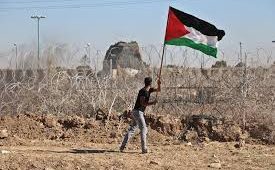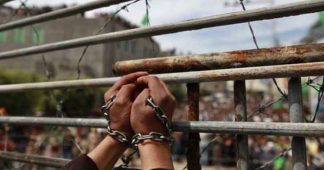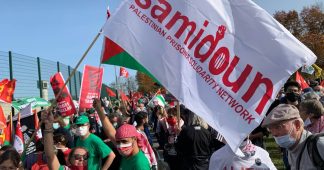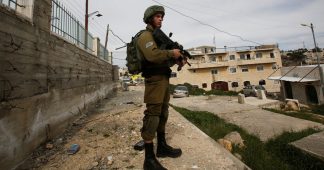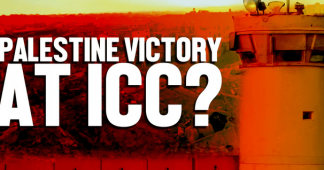April 30, 2021
A major new report by Human Rights Watch says for the first time that Israel is committing crimes of apartheid and persecution in the Occupied Palestinian Territories. The international human rights group says Israeli authorities dispossessed, confined and forcibly separated Palestinians. “For years, prominent voices have warned that apartheid lurked just around the corner. But it’s very clear that that threshold has been crossed,” says Omar Shakir, Israel and Palestine director at Human Rights Watch. “It’s time for the international community to recognize the reality on the ground for what it is — apartheid and persecution — and take the steps necessary to end a situation of this gravity.”
Transcript
AMY GOODMAN: After weeks of speculation, Palestinian President Mahmoud Abbas has postponed next month’s parliamentary elections, which would have been held for the first time in 15 years in the Occupied Territories. Abbas said the delay was caused by Israel’s refusal to promise that thousands of Palestinians living in Israeli-occupied areas of Jerusalem could vote in the election. The decision comes at a time when a rift is growing within the Fatah party.
Well, earlier this week, Human Rights Watch released a major report saying for the first time that Israel is committing crimes of apartheid and persecution in the Occupied Palestinian Territories. The international human rights group says Israeli authorities have dispossessed, confined and forcibly separated Palestinians. Human Rights Watch concluded, quote, “the Israeli government has demonstrated an intent to maintain the domination of Jewish Israelis over Palestinians across Israel and the Occupied Palestinian Territories.” Human Rights Watch also released this video alongside its report.
HUMAN RIGHTS WATCH VIDEO: Apartheid. While many associate the word with South Africa, “apartheid” is a universal legal term that refers to severe discriminatory oppression. Apartheid is also a crime against humanity. Its definition in the 1973 Apartheid Convention and the 1998 Rome Statute of the International Criminal Court is made up of three key elements: an intent to maintain the domination by one racial group over another, systematic oppression by one racial group over another, and one or more inhumane acts as part of that oppression.
Persecution is a crime against humanity under the Rome Statute of the International Criminal Court. It is made up of two primary elements: a discriminatory intent, leading to severe deprivation of fundamental rights of a racial, ethnic or other group.
On the basis of these definitions and its research, Human Rights Watch finds that Israeli authorities are committing the crimes against humanity of apartheid and persecution. Human Rights Watch finds that the elements of the crimes come together in the Occupied Palestinian Territory, pursuant to an Israeli government policy to maintain the domination by Jewish Israelis over Palestinians across Israel and the occupied territory. In the occupied territory, that intent has been coupled with systematic oppression and inhumane acts committed against Palestinians living there.
The Israeli government is the main authority across Israel and the Occupied Palestinian Territory. In these areas, Israeli officials have demonstrated a discriminatory intent to maintain domination over Palestinians by ensuring control over land and demographics by Jewish Israelis. Take the Jerusalem municipality as an example: The Israeli authorities’ goal is to maintain a sizable Jewish majority by boxing in Palestinian areas while helping predominantly Jewish areas to flourish.
Israeli authorities maintain a two-tier system which privileges Jewish Israelis over Palestinians. The means used by Israeli authorities in the occupied territory amount to the systematic oppression needed to establish the crime of apartheid. Israeli authorities have committed a range of abuses against Palestinians. In the occupied territory, those abuses include mass land confiscation, the denial of residency rights and the suspension of civil rights, and rise to the threshold of inhumane acts and severe abuses of the fundamental rights of Palestinians. The international community should recognize the reality on the ground for what it is and press the Israeli authorities to end apartheid and persecution.
AMY GOODMAN: That’s a new video by Human Rights Watch, issued this week. It comes as Israel is being hailed around the world for vaccinating 60% of its population, the highest percentage in the world, but only 3% of Palestinians are vaccinated.
On Tuesday, White House Press Secretary Jen Psaki was asked about the Human Rights Watch report on Israeli apartheid.
PRESS SECRETARY JEN PSAKI: As to the question of whether Israel’s actions constitute apartheid, that is not the view of this administration.
AMY GOODMAN: Well, for more, we’re joined by Omar Shakir, Israel and Palestine director at Human Rights Watch, lead author and researcher for their groundbreaking new report called “A Threshold Crossed: Israeli Authorities and the Crimes of Apartheid and Persecution.”
Omar, welcome back to Democracy Now! Start off by talking about the research you did into this and the significance of Human Rights Watch using, for the first time officially, the term “apartheid” when looking at how Israel is dealing with the Palestinians.
OMAR SHAKIR: Thank you for having me, Amy.
We spent over two years conducting the research for this report. What we tried to do is to connect the dots behind years of Human Rights Watch research — we’ve been working on Israel and Palestine for more than three decades — as well as look at new case studies we conducted for this report and review Israeli government planning documents, statements by officials and other materials. When we looked at all the evidence, we then compared it against established law on discrimination, including the universal prohibition on severe discriminatory oppression and the crimes against humanity of apartheid and persecution, as described in the video. When we did so, we reached the conclusion that Israeli authorities are committing the crimes against humanity of apartheid and persecution.
The report is entitled “A Threshold Crossed” because for years prominent voices have warned that apartheid lurked just around the corner. But it’s very clear that that threshold has been crossed. It well may have been crossed years ago, but, without doubt, that corner has been turned. And it’s time for the international community to recognize the reality on the ground for what it is — apartheid and persecution — and take the steps necessary to end a situation of this gravity.
AMY GOODMAN: And, Omar, what would be those steps?
OMAR SHAKIR: We list several steps on the international community’s table that they should take immediately as a result of this report. First is for the International Criminal Court to investigate and prosecute these crimes, as well as for national courts to do so under the principle of universal jurisdiction. We call for the issuance of targeted sanctions, including asset freezes and travel bans against those Israeli officials implicated in the crime. We call for all states, including the United States, to condition all arms sales and military and security assistance on Israeli authorities on taking steps to end apartheid and persecution. We call on all countries to evaluate its engagement with Israel to ensure noncomplicity in the crimes, including bilateral agreements.
And, of course, to get to all these steps, step number one is to call a thing by its name, to call a spade a spade, to recognize that the reality we face on the ground today is not merely a temporary occupation. Depriving millions of Palestinians of their fundamental rights solely because of who they are speaks to a larger policy, a policy to privilege one people at the expense of another. A 54-year occupation is not temporary. A 30-year peace process will not dismantle systematic repression. What’s needed is an entire new paradigm shift that’s rooted in the protection of human rights and accountability.
AMY GOODMAN: What do you make of the White House spokesperson Jen Psaki’s response, saying we just don’t share the view, she was saying, of Human Rights Watch?
OMAR SHAKIR: I think the reality is it’s going to take time, of course, for the international community to grapple with this reality on the ground. Human Rights Watch, by no means, is the first organization to make this assessment. Palestinians have been describing their lived experience as apartheid for years, if not decades. The Israeli human rights group B’Tselem reached a conclusion earlier this year. Other prominent commentators have been talking about apartheid as a hypothetical. But yet, the international conversation is so steeped in these assumptions around the peace process and the temporary nature of abuse that they’re not going to be undone overnight. So I think a big part of the challenge incumbent upon us now is to really call on folks to understand and speak out to the reality for what everybody sort of knows is the case, and then to take the steps necessary.
So, I’m not surprised that the U.S. government, which has been deeply involved, obviously, in supporting Israeli government policies, is not yet ready to make that jump. I am encouraged, you know, that the statement was constructive, in the sense if you look at the larger picture of wanting to look more in depth at the report and its findings. We hope the U.S. government and other governments will do so. And we look forward to engaging them on the report and its recommendations.
AMY GOODMAN: Omar Shakir, can you comment on what’s happening in the Occupied Territories with Palestinians’ access to vaccines? Israel is being hailed around the world as the country that has vaccinated the highest percentage of its population, more than 60%. But we’re talking about, well, according to Haaretz in the last day, 3% of Palestinians have been vaccinated. Talk about the situation. And who is responsible here?
OMAR SHAKIR: Absolutely. Look, today, between the Jordan River and the Mediterranean Sea, you have one government, the Israeli government, that primarily rules over these areas, where about 6.8 million Jewish Israelis and 6.8 million Palestinians live. And when it comes to vaccines, the Israeli government has vaccinated the vast majority of Jewish Israelis. And when it comes to the 6.8 million Palestinians, they have vaccinated Palestinian citizens, who make up — the majority of those, who make up about 1.5, 1.6 million people, as well as Jerusalem residents, but they have largely not vaccinated the 4.7 million Palestinians in the West Bank and the Gaza Strip who live under Israeli rule. This creates a dynamic in parts of the West Bank where on one side of the road you have people who are receiving a vaccine because they’re Jewish, and people on the other side of the road who are not receiving a vaccine because they’re Palestinian. It really sort of boils down to that, where you can have a 25-year-old Jewish Israeli settler who is eligible for a vaccine, while a 47-year-old Palestinian man, who may have health conditions, has yet to receive it.
The Israeli government, of course, says that this is the responsibility of the Palestinian Authority. But the law of occupation is quite clear that an occupying power has the duty to ensure medical supplies, including those needed to combat a pandemic, to the occupied population. And, of course, that obligation is heightened in the context of a half-century occupation, where the Israeli government has developed a sophisticated machinery to rule over Palestinians, yet seeks to offload the responsibilities to the health of the population, seeking rather only to control the land and to ensure that Jewish Israelis living in this territory are a fully integrated part of the system in Israel, while Palestinians are stuck living in a situation of deep, systemic oppression. And this dynamic very much is at the heart of the finding of apartheid and persecution that Human Rights Watch reached.
AMY GOODMAN: Omar Shakir, you are the Israel and Palestine director for Human Rights Watch. We’re speaking to you in Amman, Jordan. You were expelled by Israel. Have you ever been allowed back? And what is Israel’s treatment of human rights observers in the Occupied Territories?
OMAR SHAKIR: The Israeli government indeed did deport me in November of 2019. They made clear, and the Supreme Court upheld, an interpretation of their law of entry that found that I fell afoul as result of my human rights advocacy, both before I joined Human Rights Watch as well as my work at Human Rights Watch. As a result of that determination, I am unable to return to Israel and Palestine to cover human rights abuses, to do my job on the ground.
Of course, the treatment that I’ve received, I think, speaks to Israel’s larger treatment of human rights defenders. Of course, Palestinian human rights defenders face it the worst. Israeli human rights defenders also face significant restrictions. To give one other example, a Palestinian staff member of Amnesty International, Laith Abu Zeyad, has, since 2019, faced a travel ban by the Israeli authorities on unspecified security grounds. He was not able to visit his mother in a hospital in Jerusalem three kilometers from his home as a result of this travel ban, where she was receiving chemotherapy. She passed away. He has challenged this decision with Amnesty International in the Israeli court system, and they ruled against him based on secret evidence. And he wasn’t even able to attend his court hearing as a result of the travel ban. Palestinian human rights defenders have faced criminal charges. They’ve faced other sorts of restrictions. Israeli groups have been maligned. Human rights defenders internationally have been denied entry. This is a reality today. The Israeli government not only continues its systematic rights abuse, but muzzles those who speak out and document those abuses.
AMY GOODMAN: I wanted to ask you about the latest news that happened overnight, Palestinian President Mahmoud Abbas postponing next month’s parliamentary elections, the first in 15 years, in the Occupied Territories, blaming Israel for refusing to promise that thousands of Palestinians living in the Israeli-occupied areas of Jerusalem could vote in the election. This is what he said.
PRESIDENT MAHMOUD ABBAS: [translated] Facing this difficult situation, we decided to postpone the date of holding legislative elections until the participation of Jerusalem and its people is guaranteed. Jerusalem will not be compromised, and our people in Jerusalem will not give up their right to exercise their democratic rights.
AMY GOODMAN: Abbas’s decision comes at a time when there is a growing rift within his Fatah party, after the jailed Palestinian leader Marwan Barghouti recently endorsed a rival slate to challenge candidates backed by Abbas. Your comments?
OMAR SHAKIR: Look, I mean, there’s two separate issues here. One is, absolutely, East Jerusalem, under international law, is a part of the Occupied Palestinian Territory, and of course its residents should have the right to vote in elections for the Palestinian Authority. The reality is, while Israel has annexed this area — you know, the vast majority of the world do not accept that annexation — it doesn’t change the status of that territory. And, of course, the majority of Palestinians there don’t vote in national Israeli elections, many of whom are stateless, you know, without any sort of permanent, stable legal status, and face these restrictions.
But I think, more to the point here, this really is pretext. Human Rights Watch has documented, for years now, the increasingly authoritarian trend of the Palestinian Authority, as well as Hamas authorities in the Gaza Strip. We’ve documented systematic arbitrary arrest and torture of critics and opponents, over recent years the increasing role security services have in making decisions. And it was quite clear, as you noted, Amy, that there were challenges to Abu Mazen, Mahmoud Abbas’s rule even within the Fatah party. And I think many see this move as being done out of concern that this election, which all along was being set up to — you know, not really to offer Palestinians a viable chance to change and vote their conscience, but really as a rubber stamp, not only for the PA in the West Bank, but Hamas in Gaza. But when that was threatened, they canceled elections.
It’s an unfortunate reality. Palestinian authorities, as they are, manage affairs in only a small part of the entire Occupied Palestinian Territory. Israeli authorities remain — retain overarching control. But, of course, we can’t separate the PA’s repression of critics and dissidents and more general ineffective rule from the larger oppression Palestinians face, including apartheid and persecution at the hand of Israeli authorities. Palestinians are stuck between two authorities, both of whom have engaged in different forms of repression, both of whom are holding them back from the realization of their full rights.
AMY GOODMAN: And finally, Omar, this latest news, at least 44 ultra-Orthodox Jews dying, dozens injured, after a stampede during a religious gathering, a pilgrimage. An estimated 100,000 people gathered at Mount Meron late Thursday. Stampede occurred in the early hours of Friday morning, after some appeared to slip on stones leading to a sloped passageway, triggering what one local news site described as a “human avalanche.” Warnings have been issued over the years saying the site was not safe for mass gatherings. This was one of the first major gatherings with COVID restrictions being lifted.
OMAR SHAKIR: It’s an absolute tragedy. And I think, you know, we’ve seen, I think, over the last year, in the wake of COVID, sort of the challenges that the Israeli government has had in dealing with some of the gatherings of more religious Jewish Israeli communities across the country. You know, this is the sort of thing that was warned about from some of the reporting that’s come out from inside Israel, that watchdogs had warned that this scenario was possible. You know, during the pandemic, we saw, of course, examples of gatherings of different religious communities that the government sort of attributed to the rise of cases in particular areas. So, it’s very clear that there are important issues here and that the Israeli government, whether or not it’s formed in the coming days and weeks, or whether or not we head back to elections — these are the sort of things that fall by the wayside as politicians go back to back in rounds of elections. So, it’s a really terrible tragedy. You know, obviously, the condolences of many in the world go out to the victims. You know, really awful human stories that are coming out, one that I read earlier today of a young boy who was being put in a body bag while his mother was calling him. Really awful, avoidable tragedy. And I hope the Israeli government will take steps to ensure this doesn’t happen again.
AMY GOODMAN: Omar Shakir, I want to thank you for being with us, Israel and Palestine director at Human Rights Watch. We’ll link to your report, “A Threshold Crossed: Israeli Authorities and the Crimes of Apartheid and Persecution.” Omar is speaking to us from Amman, Jordan.
Next up, after protests this week over the use of the remains of an African American child killed by Philadelphia police in the 1985 MOVE bombing, the University of Pennsylvania and Princeton University have both apologized. We’ll speak with a Princeton student who organized a protest on campus and the historian Sam Redman, author of Bone Rooms: From Scientific Racism to Human Prehistory in Museums. Stay with us.
Published at www.democracynow.org
